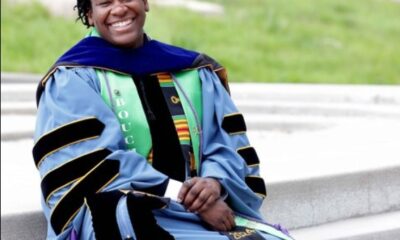News
OPINION: When I Forged My Exam Record
Published
7 months agoon
By
Editor
Tunde Odesola
My father, Pa Bisi Odesola, is a retired builder. He owned a little construction concern, Bisi Builders, which constructed a number of buildings in Ikoyi, Victoria Island, Lekki, Ajah and across the country. He exposed me and my immediate younger brother, Biodun, to site life at tender ages.
Don’t get it twisted, please; we were not given the ‘oga-pikin’ treatment on site. When you get to site, you pull off your fine clothes and step into raggy clothes fit for dirt. Imagine yourself alighting from a brand-new car, cutely dressed, and f-i-a-m, you’re in rags within the twinkle of an eye, clutching a headpan, a shovel and a lawani hat made of a cement bag.
The construction site is unlike the football field of superstars. It is a level-playing field where every ‘lebra’ is a dusty sparrow with equal rights and height, ‘aparo kan o ga ju ’kan lo’. On-site, you don’t need formal education to use literary devices. Labourers call their workplace, work-and-chop or karikachop – a smart caricaturing of the literary device caricature.
For me, site life exemplifies the swiftness in man’s grace-to-grass fall just as it shows the slowness in his grass-to-grace rise. Every morning, me, an ‘aje butter’, swiftly changes into rags but at the end of the day’s drudgery, changing back to my nice clothes would not only be slow, owing to fatigue, I’m not likely to be driven home in an air-conditioned car as my father would’ve left for some other duties, leaving me at the mercy of the Molue and its godly conductors.
FROM THE AUTHOR: OPINION: The Humiliating Troika Of Obasanjo, Shettima And Bakare (2)
As a secondary school student on holiday job, I worked as a labourer in the rehabilitation of the palace of the Ologere of Ogere-Remo and in the construction of some buildings belonging to the late Prince Babington Ashaye in Ogere, where I lived with other artisans while the job lasted.
One of my father’s able lieutenants, Boda Mike, aka Engineer Michael, was a thorn in my flesh. He was always hassling everyone, telling them to hurry up. “Tunde, òle ni ó, òle ni ó. Wo bo se ngbese nle. A ni sun bi o! Tunde, you’re lazy, you’re foot-dragging. We won’t sleep here!”
I didn’t understand why Boda Mike was in a hurry when the job was ‘German floor’ casting, which can’t be abandoned uncompleted. It’s a type of task called finish-and-go. If you finish the whole day’s job in five hours, you’re free to go home, and if you like, finish it in 24 hours, that’s when you will leave. I don’t like being hassled. I don’t like site work. The only time I didn’t wear a frown on site was when I was being paid.
I saw some labourers being beaten by their foremen for stealing on site. I was never beaten on site. Because I never stole. But I was beaten off-site. At home and school. For forging my exam document. When you receive site beating, Hitler would feel sorry for you. That was what I received when I forged my report card. How I wish I could tell my father, “I can’t forge what belongs to me.”
Seriously speaking, I think I have some things in common with President Tinubu. My alma mater, Archbishop Aggey Memorial Secondary School, Mushin, is extinct. But that was my school. Former Lagos Commissioner for Special Duties, Dr Muiz Banire, was two years my senior while I was three years ahead of the incumbent Speaker of the Lagos State House of Assembly, Mr Mudashiru Obasa. I also have living classmates, Asiwaju has no secondary schoolmates. He’s truly the last man standing. He must have shed more tears than the crocodile, mourning his classmates.
FROM THE AUTHOR: OPINION: The Humiliating Troika Of Obasanjo, Shettima And Bakare (1)
During Tinubu’s tenure as governor, the Lagos State Government had returned Aggey to its Catholic Church owners but while other returned missionary schools lived, my school died. As old students, we tried to revive it, but death didn’t unclasp its jaws. The relics of Bishop Aggey remain till this day, housing men of the underworld in the forest it has become right in the heart of Mushin. If my school could die an unnatural death, who says the President’s imaginary secondary school – Government College, Lagos – couldn’t? The real Government College in Surulere, Lagos, a boys-only school, founded in 1974, is still standing, but Tinubu, who was the sole student of his own Government College, Lagos, pulled it down and erased it from public memory upon graduation in 1970!
Four other colleges were established by the Lagos State military administration of Brigadier General Mobolaji Johnson, along with the Government College, Surulere, in 1974. One of them was Government College, Agege, (a girls-only school) which was in my neighbourhood. I had wondered if Asiwaju’s name, Bola, and his toothy smile, could’ve made him mingle among female students unnoticed, wearing a blue beret. But this school was established in 1974, too!
The President’s secondary school record he submitted to Chicago State University when seeking admission claimed he finished secondary school in 1970 like the one he filled in 2022 while running for Presidency said he finished ‘A’ Level in the same 1970. Iwin! Double-barrel Tinubu!
The conflicting 1970 secondary school graduation dates Asiwaju claimed in his affidavits are just too conspicuous to overlook. They’re like missing incisors, very difficult to hide. I’ve told all that cared to listen: Tinubu truly went to CSU and he graduated with flying colours. There’s no way any executive official will work with ExxonMobil Oil Producing in America with fake American academic results.
Believe me, I have some things in common with the President. I didn’t collect my university certificate upon graduation from Abia State University in the early 1990s because my first name, Isaac, was wrongly spelt. So, y’all should stop troubling the rich husband of Remi over one yeye certificate. Who certificate epp? I never went back to Abia to collect my certificate but I’ve officially requested my transcript a couple of times. I’ve never used my certificate. I only use the ‘Notification of Result’ issued to me. Like Tinubu, like Tunde.
FROM THE AUTHOR: OPINION: The Humiliating Troika Of Obasanjo, Shettima And Bakare (1)
I forged my secondary school report card. But I’m smarter than the President because I was an underage student in class two when I perfected my own forgery. And I did a perfect job. I wasn’t caught until my father’s overzealousness undid me. Gawd! I got the beating reserved only for a ‘lebra’.
This is the story of my forgery. In my time, students only knew their teachers by their surnames. They were gods with only one name each. Mr Lawal was my class teacher but I didn’t know. He didn’t know me too because I was never in class when he came for the early morning roll call. Like Mohbad, like Tunde: Dis school don taya me…, I go school but I no go class; daddy, I am sorry, I don dey skip classes, Omo Baba Odesola ti wonu aye o….
When I got my report card and saw I wasn’t in the top three, I knew something had to give. I knocked off the (1) that precedes 12 and changed my position from 12th to 2nd. Me, I didn’t go to Oluwole o. I gave the result to my father who still said there was room for improvement. I wondered what he would’ve said if he knew my actual position in class.
Everything was going well until one afternoon when he paid his usual surprise visit to me in school. He was already in the staff room and Mr Lawal sent for me. Uhmmm!
Mr Lawal asked, “Is this your son? “Yes, my father answered. “Are you in my class?” the teacher asked me. “Yes, sir,” I answered. “I’ve never seen you in my class!” My Lawal brought out the register, my name was missing. My father didn’t understand how a student who came second in class wouldn’t be on the register, so he showed my report card to Mr Lawal.
My father sought the help of some hefty senior students who carried me like a log and he flogged me like a slave. My teacher begged my father that the beating was too much. When he let go of me, I was bleeding from my face, head, back, hands and legs. He told Mr Lawal and two other teachers, Mr Akintola and Mr Adetunji (TD master), to give me six strokes of the cane each every morning, and sign a log showing I received 18 strokes each day. Mr Adetunji and Mr Akintola beat me for a couple of days and stopped but Mr Lawal didn’t. He beat me every morning and signed the log book.
I have confessed to my crime. If every Nigerian confesses, how many shall be blameless? Nigeria needs a total overhaul.
Email: tundeodes2003@yahoo.com
Facebook: @Tunde Odesola
X: @Tunde_Odesola
You may like

By Lasisi Olagunju
I do not believe that the president of any country will deliberately wreck everything. Their problem may be arrogance or ignorance – or arrogance in ignorance. Or, they may be worshipping wrong gods or feeding their gods with what they must not eat.
You remember Sir Shina Peters’ song for M.K.O. Abiola on the billionaire’s implacable friends who refused to eat his food?
“You gave smooth pounded yam to your friend,
Your friend refused to eat.
You made soft, mushy amala for your friend,
Your friend refused to eat.
You called your friend,
Your friend refused to answer you.
You do not know what they say you did wrong.”
There are at least two sides to a story such as this. Why would I give my friends food and they refuse to eat? Why would I shout their names and they ignore me? Am I calling the right names? If my offerings are right, shouldn’t I then check if they are really my friends?
The ace musician sang that song years before June 12 happened to Abiola. The musician may not know, but that chant is straight from the lore studio of the priests of life.
The foundation story of the song I tell here:
One ancient Yoruba king called Oniregba Osodi, at the beginning of his reign, asked his priests if his era would be peaceful and prosperous. The king was told to take care of all birds in his kingdom because they were hungry and angry and would hurt his happiness.
“What should I do and where are the birds?” the king should ask that question but he did not ask. He was the smartest and the wisest human being around, so he thought.
Instead of asking for directions, the king announced that he knew the road and blurted out orders. He commanded every man and woman in his kingdom to bring out all their grains and feed their ducks and fowls. The people brought out their corn and guinea corn and fed their ducks and pigeons, chicks and chickens.
The king was happy and satisfied.
But, the real hungry, angry birds were looking and watching.
“This oba is king also in idiocy,” they concluded and resolved to teach the powerful how to be wise.
Then, they struck. Nothing Oniregba did amounted to anything. He moved from market to farm, all was in vain. His efforts were like Abiku’s bangles in Soyinka’s lines. He sent his servants on an errand, they did as Alaafin Aole’s spell ordered them: The messengers did not come back. They even did worse. They created their own message, like Afonja did, and delivered the same to an audience different from their lord’s. Wracked by hunger and want, shouts of “ebi npa wá” rent the town while disease and death and general pestilence reigned.
MORE FROM THE AUTHOR: OPINION: Petrol Pains, Wilderness Wanderings
In the midst of the commotion, the sad king, in tears, challenged his priests on the failure of their prescription. “False prophets,” he called them.
They replied the king that he did not feed the birds as they counseled him to.
He said he did. They told him he didn’t.
The king gave a detailed account of his specific orders and how they were carried out.
The priests exchanged looks and laughed. They told the king: “Kabiyesi, you offered the wrong sacrifice to the wrong birds in the wrong place.”
The wise ones moved near the king and, in plain language told him who was hungry and angry and needed to be fed. He wondered why the priests did not tell him this the other time; the priests reminded him of his haste, his arrogance, ignorance and lack of decorum. “You didn’t wait and didn’t ask,” they told him. The king’s royal head wisened. He was sober. Now, he did what the priests told him to do. He didn’t have to wait long before his salvation came. His reign was long in peace, happiness and prosperity.
And, so, in Iregba till tomorrow is the song:
We made smooth and soft pounded yam,
We gave the birds of Iregba,
The birds said no, they won’t eat.
We rolled out pots of succulent amala for the birds of Iregba,
The birds said it was not their food,
They refused to eat…
When we gave the right meals to the big birds,
They ate and chirped with joy…
I did not make this story up. If you are a Yoruba and you are like me with a knowledgeable ancestor, consult him. Even if the forebears are like mine, long dead, their undying spirit should whisper to you the truth in the tale. But if you have no father and no mother, and you have no idea where their bones rest, put a call through to Professor Wande Abimbola. He has the knowledge. Or you can go to Chief Yemi Elebuibon in Osogbo. The tale is his to retell. He has a fuller version recorded in one of his books.
MORE FROM THE AUTHOR: OPINION: For Yoruba Muslims And Pentecostals
Except he retraces his steps and changes the deity he serves, by the time Alhaji Bola Ahmed Tinubu ends his tenure, he will be remembered for creating greater misery and more poor people than have ever lived in Nigeria. I don’t think that will be an enviable legacy. But he chose it. Every king writes the history of his era.
When a government neglects the road, opts for the bush and pumps efforts into wrong ideas, what it does is the same as starving the birds of life. Its efforts will, till eternity, roll up and down the hill like the boulder of condemned Sisyphus, the devious tyrant of Ephyra who violated “the sacred hospitality tradition” by killing visitors “to show off his power.”
Let us look at it. You moved the price of petrol from less than N200 to almost N1000 and upended every plan in every home. You pushed the naira tumbling down Mount Everest and clapped for yourself as a man of courage. Your Sango’s stone celts struck the market and shocked food prices beyond the reach of the hungry. People who need food, you continue to feed them hope in poisoned cans of tax, more tax and more levies.
Until now, I never knew that the introduction of taxes and levies could be celebrated as achievements by a government. Our government has that epaulette proudly emblazoned on its right and left shoulders. And we are so pinned down in helplessness.
The history of tax is one of intrigue. In ancient times, it was levy to fight wars. In medieval times, it was what Terence Dwyer (2014) calls “a fee derived entirely from surpluses” – the same thing Adam Smith prescribed as the “ability to pay”. In modern times, tax has become “a burden on production.” Why should people pay tax to an absent government? Tax theorists say tax is payment for government services. In ‘The Birth and Death of Taxes’ (1977) economic historians, Edward Ames and Richard Rapp, trace the history of tax as a feature of government’s economic life. They tell us that there is “a public good called protection, the suppliers of which are called governments.” They say a government “has a monopoly over the supply of protection to its subjects and taxes are the price paid to the monopolist.” They take it further, identifying two kinds of protection: one is defence, the other justice. They say when a threat is from foreigners, there is a demand for defence. When the threat is internal, one group of the same population unleashing threats against another, the good on demand is justice. Both goods should normally be exclusively government products. But, you and I know this may not always be so. A government that provides neither defence nor justice but still demands and collects tax is simply extortionate. In that case, what should the subjects do?
A newspaper on Sunday said the president had halted the proposed collection of cyber security levies from the poor and the rich. If it is true, I salute and thank the president. But, should that demand ever have been contemplated at all? What law backed the collection order in the first place? Who should collect and manage taxes under a just, normal law, the Federal Inland Revenue Service or an office created strictly to advise on security?
While we sheepishly surrender and pour libation to Abuja’s god of extortion, we are being offered as cheap ingredients for money ritual. CBN’s demand for cybersecurity tax from everyone, including sellers of pepper and locust beans, was said to be rooted in the Cybersecurity Act 2015 and its 2024 amendment. But that is not correct. The law mentions neither you nor me, nor the sweaty yam seller next street.
MORE FROM THE AUTHOR: OPINION: Murder And Vengeance In Okuama
Let us check what the law contains. Section 44 (1) of the Cybersecurity Act 2015 says: “There is established a Fund, which shall be known as the National Cyber Security Fund (in this Act referred to as “The Fund”).” Subsection (2) adds that “There shall be paid and credited into the Fund established under subsection (1) of this section and domiciled in the Central Bank of Nigeria: (a) A levy of 0.005 of all electronic transactions by the businesses specified in the Second Schedule to this Act.” And what is in that Second Schedule? The Second Schedule is plain; it habours neither the jìbìtì nor the rìkísí which we read in the CBN circular. The Schedule says: “Businesses which section 44 (2)(a) refers to are: (a) GSM Service providers and all telecommunication companies; (b) Internet Service Providers; (c) Banks and other Financial Institutions; (d) Insurance Companies; (e) Nigerian Stock Exchange.” The 2024 Act amended the 2015 Act without touching the Second Schedule. Indeed, the Amendment Act reinforces that schedule by prescribing punishments for non-payment of the levy by the businesses so listed (see Subsection 8 of the Amendment Act). So, where did Tinubu’s Central Bank of Nigeria get its long turenchi demanding that you and I start paying cyber security levies to an office that already has its share of the budget?
Apparently some people needed more money for the next night party, they did the maths and felt what the listed companies would pay them wouldn’t be enough for their frolics. They then converted all of us to ‘businesses’ without bothering to tinker with the law as they did in February. They simply asked the CBN to help them rewrite the law with a wordy circular. They did so knowing that we are a conquered people who won’t bother to check what the law truly says.
Even the businesses listed in that cyber security law will argue that they are being unfairly taxed. You would know and agree with them if you apply the theory of tax as payment for public goods. What does the government sell to them that warrant incessant taxation? How many of those businesses get ‘defence’ or ‘justice’ from the government as we know it?
“Nigerians pay one of the highest implicit tax rates in the world — way higher than developed countries,” African Development Bank’s president, Dr. Akinwumi Adesina, cried out in January 2021 at a Federal Inland Revenue Service Tax Dialogue. “Think of it”, he said “they provide electricity for themselves via generators; they repair roads to their neighborhoods, if they can afford to; there are no social security systems; they provide security for their own safety; and they provide boreholes for drinking water with their own monies.” Yet, more taxes and levies are rolled out daily against us like Israeli armoured tanks in Gaza.
We should be afraid. There was a time in France when the people were compelled to purchase salt by the government which also forced them to pay extortionate tax on it. Kings and principalities historically taxed the most important ‘goods’ of life. Salt has always been that important – even the word ‘salary’ is related to salt; you may check the history of its Latin root ‘salarium’. And, so it was heavily taxed. The French called the salt tax la gabelle. Historians Theodore Sands and Chester Higby in 1949 published an article on ‘France and the Salt Tax’. In it, they recall that the history of the gabelle under the Ancien Regime is “largely a story of increasing taxation and flourishing abuses.” They say there was even a king of France who monopolized the sale of salt and made the people pay salt tax without selling salt to them. They add that it was a period when the government was “satisfied to receive the money supplied by the system and forgot the people who paid it.” The repercussion was an insurrection that pillaged the rich and, later, ignited the French Revolution.
Today’s Nigerians are like the birds of ancient Iregba. They are hungry and angry. In his ‘Salt, Politics and the French Revolution’, Toby Jaffe warns that “everyday commodities, including food, have the power to uproot, shatter and recreate societies…The revolutionary events around the salt tax of 18th-century France teach us that something as deceptively simple as salt can be a spark plug for civil unrest and revolution.” Now that Nigeria taxes everything including hunger, may God give us the fortitude to bear what may be coming.
The author, Dr. Lasisi Olagunju is the Saturday Editor of Nigerian Tribune, and a columnist in the same newspaper. This article was first published by the paper (Nigerian Tribune). It is published here with his permission.
News
Rivers Crisis: Pro-Fubara Assembly To Screen Commissioner-nominee On Monday
Published
12 hours agoon
May 12, 2024By
Editor
The Rivers State House of Assembly members loyal to Governor Siminalayi Fubara and led by factional Speaker, Victor Oko-Jumbo, have invited a Commissioner-nominee, Danagogo Iboroma, for screening and confirmation as a member of the state executive.
Iboroma may be pencilled in to replace Zaccaeus Adangor, who recently resigned as the State Attorney General and Commissioner for Justice.
Adangor’s resignation came after he rejected his deployment to the State Ministry of Special Duties (Governor’s Office) by Governor Siminalayi Fubara.
The nominees’ invitation was contained in a letter signed by the factional Clerk, Dr. G.M. Gillis-West, who asked Iboroma to appear before the House on Monday by 10 am and sent to newsmen.
The factional clerk directed Iboroma, to appear at the Hallowed Chamber, Rivers State House of Assembly, Auditorium, Admin Block, Rivers State Government House, Port Harcourt.
The letter read, “The Rivers State House of Assembly hereby invites the following Commissioner-nominee for screening and confirmation as a member of the Rivers State Executive Council. Danagogo I Iboroma, SAN.
“Date: Monday, 13th May 2024. Time 10 am. Venue: Hallowed Chamber, Rivers State House of Assembly Auditorium, Admin Block, Government House, Port Harcourt.
“The nominee is to come along with 10 sets of his Curriculum Vitae, photocopies of his credentials and the original.”
News
Obasanjo To Adeleke: Keep The Dancing Spirit, Deliver On Infrastructure
Published
14 hours agoon
May 12, 2024By
Editor
Former Nigerian President, Chief Olusegun Obasanjo, has urged Osun State Governor, Ademola Adeleke, to continue his dancing spirit while prioritising the delivery of crucial infrastructure projects in the state.
Obasanjo, who spoke at the inauguration of a VIP lodge, an edifice located within the premises of Osun State Government House in Osogbo, recalled a private conversation he had with Adeleke when he admonished him not to stop dancing, but to work very hard to improve the lives of the residents of the state.
The former president, who declared himself as Adeleke’s dancing partner, also challenged the governor to unite the Peoples Democratic Party in the state, implement good initiatives that would affect people positively and ensure proper documentation of all his achievements as governor.
READ ALSO: Adeleke Lists New Retirement Age Conditions For Osun Teachers
Speaking in a mixture of Yoruba and English, Obasanjo said, “Some people once despise you, calling you a mere dancer. In reply, I told them that it is only happy people that used to dance. From now on, you are my dancing partner.
“What I have heard and seen since three days that I have been here If anyone is doubting you, bring the person to your state to see for himself or herself. If you remember at one time, I called you on the phone and I said don’t stop dancing but I added that, as you are dancing, ensure you are working.
“If I tell you that I don’t know what happened before you get to the government, I will be telling a lie. But you did something last week Sunday that I appreciated. You called the leaders of your party together. I am happy that you called them and brought them together. Senator Olu Alabi is here, ex-governor Olagunsoye Oyinlola is here and Fatai Akinbade too.
READ ALSO: Osun: 18 Pupils Hospitalised After Eating Contaminated Meal, Adeleke Orders Probe
“You should bring everyone on board. That is the best thing to do. I have talked to two out of three of them. It is a good move which is not only good for your party but for the state and the country. You said government is a continuum. You also said that you are working on all abandoned projects, may God crown your efforts.”
He added that he is happy that Adelek is taking project deliveries one after the other taking them.
He urged the governor to be honest with his conscience, with the people and with God.
“You have to be a man of character,” Obasanjo said.
READ ALSO: PHOTOS/VIDEO: Prince Harry, Meghan Visit Sanwo-Olu
Speaking earlier, Adeleke said his administration has completed some major capital projects, while work was also progressing on many others captured under his infrastructure plan.
According to him, the VIP Lodge would enable his administration to minimise the cost of hosting important personalities visiting the state, adding that with the completion of the project, a major milestone in cost efficiency has been achieved.
Adeleke, nicknamed the dancing governor, took the oath of office as the 6th elected governor of Osun State on Sunday, November 27, 2022, following in the political trajectory of his late elder brother, Senator Isiaka Adeleke, who was the first elected governor of the state.
PUNCH

OPINION: Taxing Hunger In Iregba

Man Kidnaps 6-year-old Cousin, Kills Victim For Recognising Him

Five-year-old Boy Shot Dead By Hijackers In South Africa
Trending

 News5 days ago
News5 days agoThe New Masquerade’ Actress, Ovularia Is Dead

 News5 days ago
News5 days agoBREAKING: Rivers State House Of Assembly Gets New Speaker

 Business5 days ago
Business5 days agoFULL LIST: CBN Publishes List Of Licensed Deposit Money Banks

 Politics2 days ago
Politics2 days agoRivers Crisis: Why Gov Fubura Got Into ‘Trouble’ – Secondus

 News5 days ago
News5 days agoFather Of 12 Found Dead Inside Brothel In Bayelsa

 Metro5 days ago
Metro5 days agoEdo: Police Patrol Van Pursuing ‘Yahoo Boys’ Rams Into Motorcycle Convening Passenger

 Metro2 days ago
Metro2 days agoKogi University Lecturer Stripped Over Alleged Sexual Harassment

 News4 days ago
News4 days agoVIDEO: Nigerian Man Exhumed After Completing 24-hour Buried Alive Challenge

 News5 days ago
News5 days agoNigerian Emerges First Black Woman To Bag PhD In Robotics At Michigan Varsity

 News4 days ago
News4 days agoNigerian’s Request To Be Buried Alive For 24 Hours Causes Stir Online [VIDEO]





















